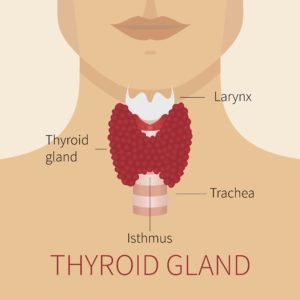I have thyroid nodules – should I be worried?

A thyroid nodule is a growth within the thyroid – a butterfly shaped gland located just below the Adam’s apple in the neck. The thyroid sends out hormones that help control the body’s metabolism. Thyroid nodules are very common and occur in 30% of all people in the United States. Like most thyroid conditions, nodules are more common among women than men. They are also more common with older age. By the age of 60, more than half of women will have a thyroid nodule. Sometimes nodules go undetected, other times you or a health care provider may feel them in the neck, or they may be seen on ultrasound or CT scan that you have for another reason.

If you learn that you have a thyroid nodule the first thing to do is see your primary care provider to obtain more information. Does your thyroid function normally or is it overactive – a condition called hyperthyroidism? Symptoms of hyperthyroidism include nervousness, feeling hot, weight loss or tremor. Does the thyroid not produce enough hormone? This condition, called hypothyroidism, has the opposite symptoms including fatigue, sleepiness, weight gain, and thinning hair. Your doctor can determine if you have either of these with a simple blood test called thyroid stimulating hormone, or TSH. Your doctor will also obtain an ultrasound of your neck to see more detail of your thyroid if you have not had this already.
Fortunately, most thyroid nodules are benign (not cancerous) and do not cause over or under-active thyroid hormones. Overall only 5-10% of thyroid nodules end up being cancer. While thyroid cancer can be seen in people of any background, age or gender, most cases occur in women, people less than 55 years old, and those with Caucasian or Asian backgrounds. It is also important to tell your doctor if you have a history of thyroid disorders in your family or if you have ever been exposed to radiation as these may increase your risk of thyroid cancer. Other symptoms of thyroid cancer may include difficulty swallowing or breathing, change in your voice with hoarseness, or swollen lymph nodes in the neck but most frequently there are no symptoms at all.

Thyroid cancer is one of the most frequently diagnosed cancers in the United States. In 2015 there were over 60,000 new cases of thyroid cancer but only 2,000 deaths related to thyroid cancer. More than 62,400 thyroid cancers are expected to be diagnosed this year. Fortunately, it is also one of the most treatable forms of cancer and can be completely cured with surgery in most cases. Surgery is the main treatment for thyroid cancer and may involve removal of all or half of the thyroid. After surgery, a small group of people may get treatment with radioactive iodine to destroy any cancer cells that may have spread beyond the thyroid gland.
So – if you have thyroid nodules, the bottom line is that you probably have nothing to worry about – but to be safe, notify your health care provider so that you can get the necessary testing to make sure it is not a thyroid cancer.
To schedule an appointment at Nebraska Medicine, call 800.922.0000.


